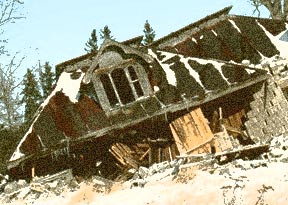Procrastinators Beware!

Deferring the common area maintenance of an owners' association, though sometimes necessary, can have negative and lasting effects upon a community. Deferrals are occasionally a financial necessity. That is, if you don't have the cash on hand, certain expenditures must wait. Postponement of necessary maintenance projects may also be seen as a money-saving technique. Deferral, in some instances, might be the sheer product of oversight. Whatever the ultimate cause of not performing routine maintenance, the outcome will often be a net cost considerably higher than having completed the work in a timely fashion.
Painting
Painting is one of the largest elements of routine common area maintenance for many associations. If ignored, a poorly maintained paint finish will lead to extensive costs for the homeowner association at the time such upkeep is eventually completed. The paint on the exterior of any building is a very important component of any maintenance plan. The panting of metal and wood trim should be done every 2-3 years. Metal surfaces typically require rust-inhibitor applications as well as a final coat of paint. The complete painting of other common area buildings should be done every 5-8 years.
Drainage
There are several other components of preventive maintenance that are just as important as painting is to an association and that will help preserve both appearance as well as property values. Rain gutters, for example, are another important component of the common area which need annual cleaning to help insure proper water run-off. Clogged drainage systems are a frequent cause of fascia wood rot as well as mold in houses today. Failure to address this issue properly could lead to unwanted costs, including litigation, both for the homeowner as well as the association.
Light Fixtures
Light fixtures, and light poles too, need to be inspected on a semi-annual basis to avoid costly repairs or accidents. A qualified contractor needs to evaluate the light poles and fixtures, as well as the mounting hardware. One should look for signs of rust and electrolysis, as well as assuring that the overall operation and appearance of the lighting device is acceptable.
Concrete, Asphalt, and Roofs
Three critical components for an association to inspect annually are concrete, asphalt, and roofs. Concrete needs to be inspected annually for cracks and raised areas, as well as degradation of the surface. Raised areas, developed over time, can create a trip hazard as well as impact the overall aesthetics of a community. Asphalt areas need to be resealed (seal coated) every three to five years to insure the integrity and the appearance of the common roads and parking lots. Roofs need to be part of an ongoing annual maintenance plan. They need to be inspected by a licensed roofing contractor or structural engineer, either one being certain to have no conflict of interest. That is to say, neither should have a financial stake in proposed future repairs. Inspections of these rooftops will help defray a huge cost to the association for extensive and otherwise premature re-roofing of common area structures.
Recreation Areas
A commonly overlooked amenity of a homeowner association that needs to be inspected annually is that of the recreational area. Playground equipment should be inspected and maintained constantly to avoid any potential injury to a child (or to the child's caretaker).
Signage
Association signage, typically viewed as non-essential, is commonly neglected. It, too, requires preventive maintenance and has an impact on an association's members as well upon its visitors. When this component is not properly maintained, it can lead to accidents or rule infractions that could be otherwise avoided. Most importantly, signage must be visible and easily readable in order to assist police and fire personnel when an emergency arises. Directories, if maintained properly, will also facilitate any emergency situation and help to assure that a victim is reached in a more timely fashion. The directory should be cleaned and updated not less than monthly to insure that it can be used for all of its intended purposes.
Reserve Study
One final issue crucial to every association and which should not be deferred is the Reserve Study. Completing and annually maintaining such a study will allow the association to budget properly and to work with its maintenance contractor(s) in keeping the association in first rate condition. The reserve study should receive a rather comprehensive updating every three years or so to insure that the Association has the most current cost estimates to base its decisions upon.
Conclusions
Using the above reminders as a guide, every association should develop its own individualized plan for maintenance and upkeep of all common areas. Deferral of necessary upkeep only serves to prolong the inevitable - - at cost (in dollars as well as property value) that is more often than not far greater than sacrificing to do what is right and necessary in a timely fashion. Determination, rather than procrastination, is the most efficient and money-saving path for the wise association to follow.
 Print
Print Email
Email







